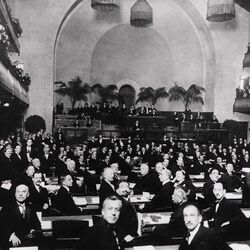Child Workers Need Aid, Says Jane Addams
Famous Hull House Founder Speaks Here in Behalf of National Effort.
NEW LAW ASSURED
That labor, adult as well as child, is the chief problem of the reconstruction period was emphasized by Miss Jane Addams of Hull House, Chicago, and one of the foremost social workers in the world, in two addresses made in Pittsburgh yesterday. She opened the membership campaign for the National Child Labor Committee in the Union Arcade in the afternoon and spoke before the Western Pennsylvania League of Women Workers at a banquet held in McCreery's in the evening.
Miss Addams would not discuss pacifism or her connection with the movement, declaring that she herself would write any statement she might have to make on that subject or the statements of government agents. She did, however, talk freely on the child labor movement, for which she urged the heartiest support, and the movement for a League of Free Nations.
At the banquet of the women workers she spoke on "Girls' Part in Reconstruction Work."
Child Labor Discussed.
Miss Addams declared that the new Federal child labor law, which she believed would be passed by Congress without difficulty, would embody the essential points of the old law recently declared unconstitutional and would aid in eliminating this evil.
"Within 24 hours after the law had been declared void children of 6 to 10 years old were working 11 hours daily in Southern mills," she declared.
She [endorsed] the program of the [page 2] National Child Labor Committee and declared that for years she had seen the evil of the practice. "Child labor is not the cure for poverty," she stated.
Adult labor problems, she declared, must await the outcome of the peace conferences. "There are many problems to come before it, the solutions of which may have a great bearing on the labor situation," she said. "I am not in favor of the proposed bill to prohibit immigration for a period of time and I have never felt that restriction of immigration offered a solution to the problems of the working men. The unions' objections to immigrants can be met largely at the peace table by an international law limiting hours of labor. Such standardization would go far toward removing the objection that the foreigner will work longer hours than the American."
[Endorses] League of Nations.
A league of free nations she declared the only means of establishing a permanent peace. In this regard she said:
Is it becoming clear that nations cannot oppose their political frontiers as an obstacle to free labor and exchange without suffering themselves and causing suffering; that the world is faced with a choice between freedom in international commerce or international conflicts of increasing severity? Under this new standard of measurement, preferential tariffs inevitably disappear because the nation denied the open door must suffer in its food supplies; the control of strategic waterways or interstate railroad lines by any one nation who might be tempted to consider only the interest of its own commerce becomes unthinkable. All that then would be necessary to secure the internationalization of the Straits of Bosporus would be a demonstration of the need in Western Europe for Russian wheat, which is now exported so capriciously; the international building and control of a railroad into Mesopotamia would depend, not upon the ambition of rival nations, but upon the world's need of the food which could again be secured from the capacious valley of the Euphrates by the restoration of the canal system so long ago destroyed.
But such action would establish at least six out of the 14 points laid down by President Wilson as a program for the permanent peace of the world. It would, moreover, be not a counsel of perfection, but an actual achievement. The widespread response to the human demand of supplying food to the world may become the great factor in securing a permanent peace. To declare that this a "war to end war" and that the peace commission must provide for an enduring peace is, of course, not enough.
Moral Hopes Unfilled.
Never was so much said about bringing war to an end forevermore as by the group of Allied nations who waged the last campaign against Napoleon. They declared in the grandiloquent phrases they used so easily and which we rather avoid, that their aims were "the reconstruction of the moral order," "a regeneration of the political system of Europe" and "the establishment of an enduring peace founded upon a just redistribution of political forces." But Napoleon was "crushed" and none of their moral hopes were fulfilled. The mere protestations were too negative, there was no real basis upon which to build the new world order.
Miss Addams declared herself a citizen of the world in her address before the several hundred members of the League of Women war Workers, and stated that the part women must play in reconstruction problems must be largely one of patience until the League of Nations is established and has laid down its principles.
She declared that food, and the necessity of world feeding, has already created a League of Nations. "The need for woman to feed her children began the domestic moralization of the race," she said. "The need of feeding the starving nations may start the political moralization of the world."
Women Are World Feeders.
Woman has always been the world-feeder, she declared, and must continue on her business. For America she forecasted a period of industrial unrest. Woman must give way to returning soldiers, she said, and do it cheerfully, even if [it] meant the sacrifice of income and position. In the end, she said, industry would recover. She pleaded for national child labor laws, and declared that women must study the objects of the peace conference and give their moral support to President Wilson's program.














Comments